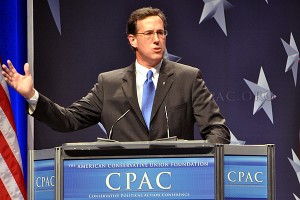National
GOP presidential hopefuls sign anti-gay marriage pledge
Romney, Bachmann, Santorum pen their names to document


Mitt Romney was among the GOP candidates who signed the marriage pledge (Blade file photo by MIchael Key)
A trio of Republican presidential candidates have signed a pledge promising to oppose same-sex marriage if elected to the White House and to establish a presidential commission to “investigate harassment of traditional marriage supporters.”
The three GOP candidates — former Massachusetts Gov. Mitt Romney, U.S. Rep. Michele Bachmann (R-Minn.) and former U.S. senator from Pennsylvania Rick Santorum — each penned their names to the pledge, which was written by the anti-gay National Organization for Marriage.
Brian Brown, president of the National Organization for Marriage, praised the three Republican presidential candidates in a statement for signing the pledge.
“Many candidates say they support traditional marriage (like President Obama!) but three GOP presidential candidates today stand head and shoulders above the crowd as marriage champions, for their willingness to go beyond words to commit to concrete actions,” Brown said. “We are grateful to Michelle Bachmann, Mitt Romney and Rick Santorum for their courage and their leadership in standing up for marriage, and so are millions of Americans who care about protecting marriage.”
According to a NOM statement, an opportunity to sign the marriage pledge will be extended to Texas Gov. Rick Perry, who’s widely expected to enter the race for the White House, as well as other major candidates if they enter the race.
Christian Berle, deputy executive director of the National Log Cabin Republicans, said the Republican candidates who signed the pledge are getting “nothing but bad press” because it has “detracted from our party’s commitment to addressing issues that matter to all Americans.”
“The last thing Republicans need or want is another group pushing the same outdated social agenda under new branding,” Berle said.
By signing the document, the three presidential candidates pledge to:
* support and send to the states a U.S. constitutional amendment that would ban same-sex marriage throughout the country;
* defend in court the Defense of Marriage of Act, a 1996 law that prohibit federal recognition of same-sex marriage;
* appoint judges and a U.S. attorney general who “will respect the original meaning” of the U.S. Constitution;
* support legislation that allowing D.C. resident to vote on whether to abrogate the district’s same-sex marriage law;
* and appoint a presidential commission to “investigate harassment of traditional marriage supporters.”
The persecution faced by those who speak out against same-sex marriage has been a frequent claim from those who oppose gay nuptials.
Last month, during a Senate hearing on DOMA, Sen. Charles Grassley (R-Iowa) asserted Republicans wanted to invite a witness to testify against in favor of the anti-gay law. Grassley didn’t name the potential witness, but said she declined to appear because of “the threats and intimidation that have been leveled not only against her but her friends and family as a result of her support of DOMA.”
Following the passage of Proposition 8, which ended same-sex marriage in California, several Mormon churches were vandalized and white powder resembling anthrax was sent to Mormon leaders. The Mormon Church was seen as having a lead role in the campaign to pass the marriage ban. However, no incidents of physical violence against supporters of Prop 8 were reported.
Romney’s decision to sign the pledge is noteworthy because he earlier declined to sign a similar anti-gay marriage pledge pushed by Iowa activist Bob Vander Plaats. At the time, Romney said he wouldn’t sign the pledge — which was signed by Pawlenty and Bachmann — because he believed it would be “undignified and inappropriate.”
The Romney campaign couldn’t be reached to comment on why he would sign one pledge opposing same-sex marriage, but not another.
The former Massachusetts governor has consistently opposed same-sex marriage. When marriage rights for gay couples were legalized in the Bay State, Romney called for a state constitutional amendment banning marriage equality. Romney has also called for a Federal Marriage Amendment banning same-sex marriage throughout the country.
In a statement to the Washington Blade, Berle took particular exception with Romney’s decision to pen his name to the pledge.
“As Republicans who want to see Barack Obama out of the White House, it is unfortunate that Gov. Romney has chosen to relegate himself to a position that’s out of step with America,” Berle said. “Our country needs candidates who will offer serious solutions on issues like runaway government spending, the debt ceiling, not inserting government into citizen’s personal lives.”
The absent signature of former Minnesota Gov. Tim Pawlenty, who’s also pursuing the Republican nomination, is also noteworthy. Like Romney, Pawlenty also declined to sign the marriage pledge pushed by Vander Plaats. However, Pawlenty said he opposes same-sex marriage and has called for a state and federal constitutional amendments banning gay nuptials.
In an e-mail to the Blade, Maggie Gallagher, NOM’s co-founder and chair, said a Pawlenty spokesperson called her and confirmed Pawlenty wouldn’t sign the pledge. The Pawlenty campaign couldn’t be reached to comment on the matter.
Bachmann and Santorum have repeatedly spoken out against same-sex marriage. Since the start of her presidential campaign, Bachmann has said she’s fine with New York’s recent decision to legalize same-sex marriage, but also has said she’d back a Federal Marriage Amendment, which would rescind marriage rights there.
Last week, Santorum, who’s also consistently backed a Federal Marriage Amendment, said during a Denver, Colo., speech that New York has “destroyed marriage” by legalizing gay nuptials.
“It is not fine with me that New York has destroyed marriage,” Santorum said. “It is not fine with me that New York has set a template that can cause great division in this country. There is not 50 definitions of marriage.”
UPDATE: On Friday, Brown announced in an appearance on MSNBC that Pawlenty would, in fact, sign the pledge. The NOM president said marriage is “an important issue on the federal level and we’re very excited that not only three, but now a fourth candidate has signed on — Tim Pawlenty we got word last night is signing on.”
Watch the video of Brown’s remarks (via Think Progress):
http://www.youtube.com/watch?v=B97gJo1h7ik&feature=player_embedded
The White House
Four states to ignore new Title IX rules protecting transgender students
Biden administration last Friday released final regulations

BY ERIN REED | Last Friday, the Biden administration released its final Title IX rules, which include protections for LGBTQ students by clarifying that Title IX forbids discrimination based on sexual orientation and gender identity.
The rule change could have a significant impact as it would supersede bathroom bans and other discriminatory policies that have become increasingly common in Republican states within the U.S.
As of Thursday morning, however, officials in at least four states — Oklahoma, Louisiana, Florida, and South Carolina — have directed schools to ignore the regulations, potentially setting up a federal showdown that may ultimately end up in a protracted court battle in the lead-up to the 2024 elections.
Louisiana State Superintendent of Education Cade Brumley was the first to respond, decrying the fact that the new Title IX regulations could block teachers and other students from exercising what has been dubbed by some a “right to bully” transgender students by using their old names and pronouns intentionally.
Asserting that Title IX law does not protect trans and queer students, Brumley states that schools “should not alter policies or procedures at this time.” Critically, several courts have ruled that trans and queer students are protected by Title IX, including the 4th U.S. Circuit Court of Appeals in a recent case in West Virginia.
In South Carolina, Schools Supt. Ellen Weaver wrote in a letter that providing protections for trans and LGBTQ students under Title IX “would rescind 50 years of progress and equality of opportunity by putting girls and women at a disadvantage in the educational arena,” apparently leaving trans kids out of her definition of those who deserve progress and equality of opportunity.
She then directed schools to ignore the new directive while waiting for court challenges. While South Carolina does not have a bathroom ban or statewide “Don’t Say Gay or Trans” law, such bills continue to be proposed in the state.
Responding to the South Carolina letter, Chase Glenn of Alliance For Full Acceptance stated, “While Supt. Weaver may not personally support the rights of LGBTQ+ students, she has the responsibility as the top school leader in our state to ensure that all students have equal rights and protections, and a safe place to learn and be themselves. The flagrant disregard shown for the Title IX rule tells me that our superintendent unfortunately does not have the best interests of all students in mind.”
Florida Education Commissioner Manny Diaz also joined in instructing schools not to implement Title IX regulations. In a letter issued to area schools, Diaz stated that the new Title IX regulations were tantamount to “gaslighting the country into believing that biological sex no longer has any meaning.”
Governor Ron DeSantis approved of the letter and stated that Florida “will not comply.” Florida has notably been the site of some of the most viciously anti-queer and anti-trans legislation in recent history, including a “Don’t Say Gay or Trans” law that was used to force a trans female teacher to go by “Mr.”
State Education Supt. Ryan Walters of Oklahoma was the latest to echo similar sentiments. Walters has recently appointed the right-wing media figure Chaya Raichik of Libs of TikTok to an advisory role “to improve school safety,” and notably, Raichik has posed proudly with papers accusing her of instigating bomb threats with her incendiary posts about LGBTQ people in classrooms.
The Title IX policies have been universally applauded by large LGBTQ rights organizations in the U.S. Lambda Legal, a key figure in fighting anti-LGBTQ legislation nationwide, said that the regulations “clearly cover LGBTQ+ students, as well as survivors and pregnant and parenting students across race and gender identity.” The Human Rights Campaign also praised the rule, stating, “rule will be life-changing for so many LGBTQ+ youth and help ensure LGBTQ+ students can receive the same educational experience as their peers: Going to dances, safely using the restroom, and writing stories that tell the truth about their own lives.”
The rule is slated to go into effect Aug. 1, pending any legal challenges.
****************************************************************************

Erin Reed is a transgender woman (she/her pronouns) and researcher who tracks anti-LGBTQ+ legislation around the world and helps people become better advocates for their queer family, friends, colleagues, and community. Reed also is a social media consultant and public speaker.
******************************************************************************************
The preceding article was first published at Erin In The Morning and is republished with permission.
Pennsylvania
Malcolm Kenyatta could become the first LGBTQ statewide elected official in Pa.
State lawmaker a prominent Biden-Harris 2024 reelection campaign surrogate

Following his win in the Democratic primary contest on Wednesday, Pennsylvania state Rep. Malcolm Kenyatta, who is running for auditor general, is positioned to potentially become the first openly LGBTQ elected official serving the commonwealth.
In a statement celebrating his victory, LGBTQ+ Victory Fund President Annise Parker said, “Pennsylvanians trust Malcolm Kenyatta to be their watchdog as auditor general because that’s exactly what he’s been as a legislator.”
“LGBTQ+ Victory Fund is all in for Malcolm, because we know he has the experience to win this race and carry on his fight for students, seniors and workers as Pennsylvania’s auditor general,” she said.
Parker added, “LGBTQ+ Americans are severely underrepresented in public office and the numbers are even worse for Black LGBTQ+ representation. I look forward to doing everything I can to mobilize LGBTQ+ Pennsylvanians and our allies to get out and vote for Malcolm this November so we can make history.”
In April 2023, Kenyatta was appointed by the White House to serve as director of the Presidential Advisory Commission on Advancing Educational Equity, Excellence and Economic Opportunity for Black Americans.
He has been an active surrogate in the Biden-Harris 2024 reelection campaign.
The White House
White House debuts action plan targeting pollutants in drinking water
Same-sex couples face higher risk from environmental hazards

Headlining an Earth Day event in Northern Virginia’s Prince William Forest on Monday, President Joe Biden announced the disbursement of $7 billion in new grants for solar projects and warned of his Republican opponent’s plans to roll back the progress his administration has made toward addressing the harms of climate change.
The administration has led more than 500 programs geared toward communities most impacted by health and safety hazards like pollution and extreme weather events.
In a statement to the Washington Blade on Wednesday, Brenda Mallory, chair of the White House Council on Environmental Quality, said, “President Biden is leading the most ambitious climate, conservation, and environmental justice agenda in history — and that means working toward a future where all people can breathe clean air, drink clean water, and live in a healthy community.”
“This Earth Week, the Biden-Harris Administration announced $7 billion in solar energy projects for over 900,000 households in disadvantaged communities while creating hundreds of thousands of clean energy jobs, which are being made more accessible by the American Climate Corps,” she said. “President Biden is delivering on his promise to help protect all communities from the impacts of climate change — including the LGBTQI+ community — and that we leave no community behind as we build an equitable and inclusive clean energy economy for all.”
Recent milestones in the administration’s climate policies include the U.S. Environmental Protection Agency’s issuance on April 10 of legally enforceable standard for detecting and treating drinking water contaminated with polyfluoroalkyl substances.
“This rule sets health safeguards and will require public water systems to monitor and reduce the levels of PFAS in our nation’s drinking water, and notify the public of any exceedances of those levels,” according to a White House fact sheet. “The rule sets drinking water limits for five individual PFAS, including the most frequently found PFOA and PFOS.”
The move is expected to protect 100 million Americans from exposure to the “forever chemicals,” which have been linked to severe health problems including cancers, liver and heart damage, and developmental impacts in children.
An interactive dashboard from the United States Geological Survey shows the concentrations of polyfluoroalkyl substances in tapwater are highest in urban areas with dense populations, including cities like New York and Los Angeles.
During Biden’s tenure, the federal government has launched more than 500 programs that are geared toward investing in the communities most impacted by climate change, whether the harms may arise from chemical pollutants, extreme weather events, or other causes.
New research by the Williams Institute at the UCLA School of Law found that because LGBTQ Americans are likelier to live in coastal areas and densely populated cities, households with same-sex couples are likelier to experience the adverse effects of climate change.
The report notes that previous research, including a study that used “national Census data on same-sex households by census tract combined with data on hazardous air pollutants (HAPs) from the National Air Toxics Assessment” to model “the relationship between same-sex households and risk of cancer and respiratory illness” found “that higher prevalence of same-sex households is associated with higher risks for these diseases.”
“Climate change action plans at federal, state, and local levels, including disaster preparedness, response, and recovery plans, must be inclusive and address the specific needs and vulnerabilities facing LGBT people,” the Williams Institute wrote.
With respect to polyfluoroalkyl substances, the EPA’s adoption of new standards follows other federal actions undertaken during the Biden-Harris administration to protect firefighters and healthcare workers, test for and clean up pollution, and phase out or reduce use of the chemicals in fire suppressants, food packaging, and federal procurement.
-

 State Department4 days ago
State Department4 days agoState Department releases annual human rights report
-

 South America2 days ago
South America2 days agoArgentina government dismisses transgender public sector employees
-

 District of Columbia2 days ago
District of Columbia2 days agoCatching up with the asexuals and aromantics of D.C.
-

 Politics5 days ago
Politics5 days agoSmithsonian staff concerned about future of LGBTQ programming amid GOP scrutiny











